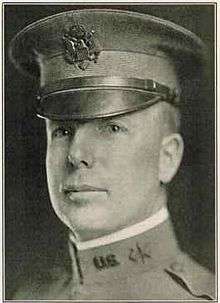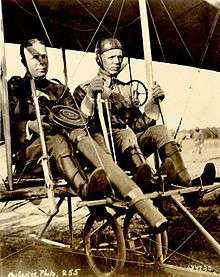Charles deForest Chandler
Colonel Charles deForest Chandler (December 24, 1878 – May 18, 1939) was an American military aviator, and the first head of the Aeronautical Division, U.S. Signal Corps that later became the United States Air Force. He was one of earliest aviators to show that a machine gun could be fired from an airplane.[1][2]


Biography
He was born in Cleveland, Ohio, on Christmas Eve, December 24, 1878. He was commissioned as a 1st lieutenant in the Signal Corps during the Spanish–American War. He was discharged in 1899 but was re-commissioned in 1901.
While in the rank of captain, he served as of the Aeronautical Division of the Signal Corps from August 1, 1907, to May 13, 1908, and also from June 20, 1911, to April 1, 1913.
With the United States entering World War I in April 1917, he quickly rose from captain to temporary colonel in a period of only seven months. He commanded the balloon section of the American Expeditionary Forces during World War I.[1] He was awarded the Distinguished Service Medal for his services during the war.
Chandler reverted to his permanent rank of lieutenant colonel in April 1920 and retired from the army for disability in the line of duty in October of the same year. He was promoted to colonel on the retired list in June 1930.
Publications
- Balloon and airship gases (1926) with Walter Stuart Diehl
Awards
Dates of rank
| First Lieutenant, Volunteer Army: 25 June 1898 (Discharged on 26 April 1899.) | |
| First Lieutenant, Regular Army: 25 April 1901 (Date of rank was 1 February 1901.) | |
| Captain, Regular Army: 2 March 1903 | |
| Major, Regular Army: 14 February 1917 | |
| Lieutenant Colonel, Regular Army: 15 May 1917 | |
| Colonel, Army of the United States: 6 September 1917 (Date of rank was 5 August 1917.) | |
| Lieutenant Colonel, Regular Army: 15 April 1920 (Reverted to permanent rank.) | |
| Lieutenant Colonel, Retired list: 18 October 1920 | |
| Colonel, Retired list: 21 June 1930 | |
References
- "Col. Chandler, 60, Air Force Pioneer. One of First Leaders of Army Aviation and Commander of A.E.F. Balloons, Dies. Flew 500 Miles In 1907. One of Earliest to Show That Machine Guns Could Be Fired From Planes". The New York Times. May 19, 1939.
- "Charles deForest Chandler". Early Aviators. Retrieved 2012-09-20.
- "Charles deForest Chandler". Arlington Cemetery. Retrieved 2012-09-20.
- Official Register of Commissioned Officers of the United States Army, 1939. pg. 891.
External links
- Charles deForest Chandler at Early Aviators